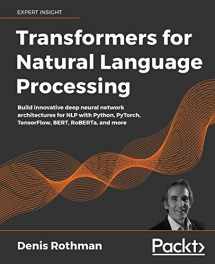
Transformers for Natural Language Processing: Build innovative deep neural network architectures for NLP with Python, PyTorch, TensorFlow, BERT, RoBERTa, and more
Book details
Summary
Description
Take your NLP knowledge to the next level and become an AI language understanding expert by mastering the quantum leap of Transformer neural network models
Key Features- Build and implement state-of-the-art language models, such as the original Transformer, BERT, T5, and GPT-2, using concepts that outperform classical deep learning models
- Go through hands-on applications in Python using Google Colaboratory Notebooks with nothing to install on a local machine
- Test transformer models on advanced use cases
The transformer architecture has proved to be revolutionary in outperforming the classical RNN and CNN models in use today. With an apply-as-you-learn approach, Transformers for Natural Language Processing investigates in vast detail the deep learning for machine translations, speech-to-text, text-to-speech, language modeling, question answering, and many more NLP domains with transformers.
The book takes you through NLP with Python and examines various eminent models and datasets within the transformer architecture created by pioneers such as Google, Facebook, Microsoft, OpenAI, and Hugging Face.
The book trains you in three stages. The first stage introduces you to transformer architectures, starting with the original transformer, before moving on to RoBERTa, BERT, and DistilBERT models. You will discover training methods for smaller transformers that can outperform GPT-3 in some cases. In the second stage, you will apply transformers for Natural Language Understanding (NLU) and Natural Language Generation (NLG). Finally, the third stage will help you grasp advanced language understanding techniques such as optimizing social network datasets and fake news identification.
By the end of this NLP book, you will understand transformers from a cognitive science perspective and be proficient in applying pretrained transformer models by tech giants to various datasets.
What you will learn- Use the latest pretrained transformer models
- Grasp the workings of the original Transformer, GPT-2, BERT, T5, and other transformer models
- Create language understanding Python programs using concepts that outperform classical deep learning models
- Use a variety of NLP platforms, including Hugging Face, Trax, and AllenNLP
- Apply Python, TensorFlow, and Keras programs to sentiment analysis, text summarization, speech recognition, machine translations, and more
- Measure the productivity of key transformers to define their scope, potential, and limits in production
Since the book does not teach basic programming, you must be familiar with neural networks, Python, PyTorch, and TensorFlow in order to learn their implementation with Transformers.
Readers who can benefit the most from this book include experienced deep learning & NLP practitioners and data analysts & data scientists who want to process the increasing amounts of language-driven data.


We would LOVE it if you could help us and other readers by reviewing the book
Book review



